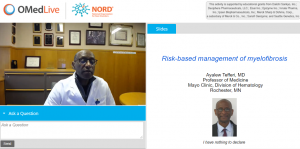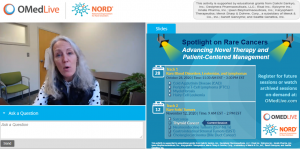Hosted by National Organization for Rare Disorders (NORD®) and PlatformQ Health, this new annual digital conference featured the latest medical education from top experts on rare blood disorders, leukemias, lymphomas and rare solid tumors.
The digital Rare Cancer Congress, held on October 28th and November 12th, engaged community-based clinicians and oncologists in 2 focused tracks on rare hematologic malignancies and rare solid tumors which encompassed 9 interactive, expert-led discussions. The goal of the Congress was to increase knowledge, competency and collaboration among primary care providers and hematology/oncology team members to reduce the time to diagnosis of rare cancers, personalize therapy selection to optimize patient benefit, and apply the latest evidence to integrate novel therapies while managing potential side effects. Attendees were able to earn up to 9 CME credits and ABIM MOC points through these educational sessions.
 As clinicians may rarely see more than one patient with a rare cancer diagnosis, it is important to understand the special needs of these patients including the need for a multidisciplinary team approach, longer and/or more frequent visits, or finding evidence-based sources. Dr. Ayalew Tefferi, Professor of Hematology and Internal Medicine stressed the importance of patient-centered care during his session on Myelofibrosis, when a participant asked, “how would you discuss the goals of therapy with patients when you’re thinking curative vs. control and is there a preference for that for one approach or the other based on risk data?” Eager to respond, Dr. Tefferi says,
As clinicians may rarely see more than one patient with a rare cancer diagnosis, it is important to understand the special needs of these patients including the need for a multidisciplinary team approach, longer and/or more frequent visits, or finding evidence-based sources. Dr. Ayalew Tefferi, Professor of Hematology and Internal Medicine stressed the importance of patient-centered care during his session on Myelofibrosis, when a participant asked, “how would you discuss the goals of therapy with patients when you’re thinking curative vs. control and is there a preference for that for one approach or the other based on risk data?” Eager to respond, Dr. Tefferi says,
“I love these questions! They are the clinical dilemmas we face on a day to day. It is nice to publish things and do lectures but ultimately you have to sit down with a patient and communicate with them. How do you communicate with a patient? Number one, be very honest and transparent. Do not look to your protocols first and your patients second. Look at your patients first, see what you think is best for your patients. What would you do if this were your mother, sister, brother? I can tell you from many years of taking care of patients, they appreciate it when you come down and be very honest and tell them the truth.”
Comparably, each speaker stressed that every patient with a rare diagnosis is truly unique, as such care should be tailored to their specific needs. Clinicians should also recognize that within a true multidisciplinary approach the patient and caregiver are essential team members and involving them is critical to understand the impact of their disease on daily life and how to provide the right care and resources.
The sessions were designed exclusively for a digital audience and streamed live to provide attendees a personalized experience that included access to top hematology/oncology experts in managing patients with rare cancers, engaging in live polling, downloadable resources, connecting with rare disease organizations for patient information and support, and the opportunity to hear expert answers to their clinical questions submitted prior to and during the event. Additionally, all the sessions were immediately available online on-demand, allowing attendees to replay and share sessions with their colleagues up to one year after the live launch.
“This was a very well-done talk that gave substance about the current understanding of the disorder, breakdowns of risk classification, areas where survival is most favorable and emerging therapies and whether they hold hope,” commented one attendee.
The NORD Rare Cancer Coalition, composed of 27 rare cancer-specific member organizations, played an integral part of the vision for the Rare Cancer Congress, as it aimed to unify and strengthen the network of health care professionals who treat patients living with rare cancers. The educational program was supported by independent educational grants from Daiichi Sankyo, Inc.; Deciphera Pharmaceuticals, LLC.; Eisai Inc.; Epizyme Inc.; Innate Pharma, Ipsen Biopharmaceuticals, Inc.; Karyopharm Therapeutics, Merck Sharp & Dohme, Corp., a subsidiary of Merck & Co., Inc.; Sanofi Genzyme; Seattle Genetics, Inc.
Start Watching On-Demand Today
All sessions from the Rare Cancer Congress are currently available on OMedLive to watch at any time.
4 CME and ABIM MOC Credits in Rare Blood Disorders, Leukemias, and Lymphomas
Session 1: Cold Agglutinin Disease (CAD): The Role of the Complement Pathway in Treating a Rare Autoimmune Hemolytic Anemia, led by Catherine Broome, MD, Associate Professor of Medicine at Georgetown University and medical director of cellular apheresis in the Lombardi Comprehensive Cancer Center at MedStar Georgetown University Hospital.
Session 2: Addressing the Challenges of Peripheral T-Cell Lymphoma Management, led by Steven Horwitz, MD, Attending Physician in the Department of Medicine at Memorial Sloan Kettering Cancer Center.
Session 3: Risk-Based Approach for Treatment of Intermediate Myelofibrosis, led by Ayalew Tefferi, MD, Professor of Hematology, and Internal Medicine in the Division of Hematology at the Mayo Clinic College of Medicine.
5 CME and ABIM MOC Credits in Rare Solid Tumors
Session 1: A Critical Update for the Multidisciplinary Team in Differentiating and Tailoring Management of Sarcomas, led by Jonathan Trent, MD, PHD, Professor of Medicine and associate director for clinical research and the director of the Bone and Soft-tissue Sarcoma Group in the Sylvester Comprehensive Cancer Center at the University of Miami Hospital.
Session 2: Where are we Headed in Thyroid Cancer? New and Emerging Treatment Approaches, led by Lori Wirth, MD, Elizabeth and Michael Ruane Endowed Chair of Medical Oncology, medical director of MGH’s Center for neck and head oncology and associate professor of medicine at Harvard Medical School.
Session 3: All About NETs: Disease Pathway, Treatment, and Clinical Trials for GEP-NETs, Pheochromocytoma, and Paragangliomas, led by Jonathan R. Strosberg, MD, Professor at Moffitt Cancer Center and leads Moffitt’s Neuroendocrine Tumor Division and Department of Gastrointestinal Oncology Research Program.
Session 4: Reducing Diagnostic Challenges and Expanding Treatment Options for Advanced GIST, led by Michael Heinrich, MD, FACP, Professor of Cell, Developmental and Cancer Biology in the Department of Medicine at Oregon Health Sciences University Knight Cancer Institute.
Session 5: Molecular Profiling and Targeted Therapies Shifting the Paradigm for Cholangiocarcinoma (Bile Duct Cancer), led by Ghassan Abou-Alfa, MD, MBA, attending physician at Memorial Sloan Kettering Cancer Center and professor of medicine at Weill Medical School at Cornell University.
Have questions about the Rare Cancer Congress or want to learn more about how PlatformQ Health is delivering impactful education to HCPs and patients? Email us at digital@platformq.com.

